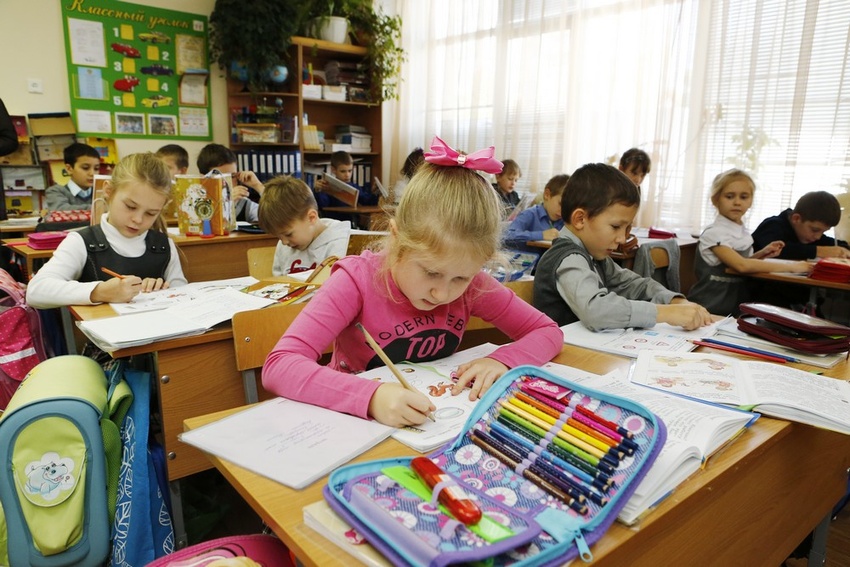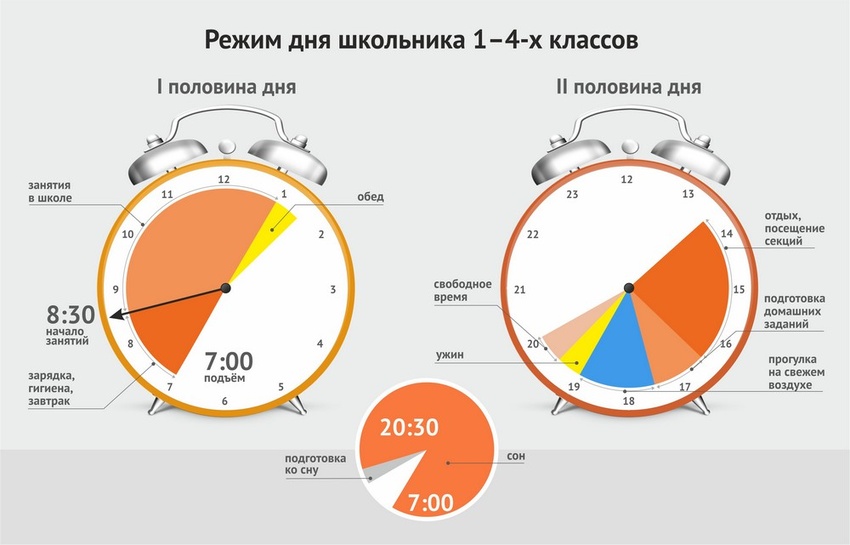A typical picture: children sit at lessons or games until late, and in the morning they cannot wake up, they go to school sluggish. Hence fatigue, drowsiness, irritability.
“The reason for this is a simple non-observance of the daily routine. Unfortunately, we forget that a person is a part of nature and it is arranged in such a way that our body has periods of decline in activity and, conversely, an increase in working capacity, - says Irina Kalashnikova. – Often, due to ordinary ignorance, we confuse this time. When it is necessary to rest - we seat the child to learn homework, when it would be necessary to gnaw at the granite of science - he walks. Few people know that the first wave of our activity falls from 9 am to 1 pm, the second - in the evening - from 4 pm to 7 pm. It is at this time that it is better to study, prepare homework, go to sections and circles.
Before drawing up a child's daily routine, Irina Alekseevna advises parents to answer a few questions for themselves.
How well do I know my child?
Can you immediately answer how much time your child spends on morning exercises and breakfast, on the way to school, studying, doing homework? If yes - good, if not - watch him during the week, but not at the very beginning of the school year, when the homework has not yet been downloaded.
Photo by Vadim Zablotsky
Analyze how much additional circles and sections take up. Ideally, a week is advised to visit no more than three sports activities and two cognitive. And they should alternate with each other. Is the child busy? See if it can handle the load. If it is difficult for him, give up something, choose what you like more.
“Fearing that the child will wander around and fall into bad company, many parents try to keep their day as busy as possible. It’s impossible: a child, like any adult, should have personal time, but with all his hobbies he simply won’t be left,” says the doctor.
Am I ready to stick to the regimen?
The best motivation for a student is the example of his own parents.
“Children are our mirror. If we say some words to a child, we must reinforce them with actions. Parents adhere to the regime - he pulls up after them. Not? He is perplexed: why should I do this then? – says Irina Kalashnikova. “By doing the same actions every day in turn, the child will soon develop a habit, and he will follow the regimen without any reminders.”
Will I be able to not get out of the mode on the day off?
“Let him sleep longer on the weekend, because he was tired for a week,” any mother will say. And instead of waking up the child at 7 in the morning, he will allow you to soak up the bed until 10-11, forgetting that you can’t get enough sleep for the future, but it’s easy to get off the regime.

Photo by Vadim Zablotsky (archive)
“If you decide to stick to the regime, then do it every day. The daily routine has no holidays and weekends. And there is nothing wrong with getting up as usual. If you get tired, you can get some sleep during the day. Otherwise, what do we get: all week we got up at 7 am, and on Saturday and Sunday - at 11 am. Such time jumps are a real stress for the body, the specialist explains. - You may have noticed how on the weekend you woke up at the same time as on a weekday, but decided to please yourself with a dream. And already waking up for the second time, you felt a little lethargic, drowsy, your head might ache.
These are the first consequences of oversleeping. We face the second on Monday.
“You think they say in vain: Monday is a hard day. Although it should be easy, because theoretically we are rested, with renewed vigor we go to work. It turns out everything is exactly the opposite: our body has to reorganize again according to the schedule that we knocked down on the weekend, ”says Irina Alekseevna.
7.00. The day begins
The daily routine by the hour is compiled individually for each child. The times for getting up, breakfast, lunch, dinner and sleep remain unchanged.
“Pupils of both the first and second shifts should wake up at 7:00 and go to bed at 20:30–21:00. High school students, due to their greater workload, go to bed a little later - at 22:00, at the latest - 22:30. Under no circumstances should you stay up until midnight. It is believed that the best rest for the brain from 21:00 to 00:00. It is at this time that the nervous system rests, ”explains Irina Kalashnikova.
Other regime moments may differ slightly depending on the hobbies of children.

The daily routine of a student of the second shift is built a little differently. Changes in the daily routine will affect only the time of study and preparation of homework.
“Studying on the second shift does not mean that the child can sleep longer. He must also get up no later than 7:30,” Irina Kalashnikova is convinced.
Don't start doing homework right after school. After 20:00, performance decreases several times. Memory and nervous system are overloaded. Irina Alekseevna advises, if possible, to do homework in the morning, with a fresh head:
“Of course, many parents worry that if they do not control the child, then in the morning he will not learn his lessons. In this case, I advise you to look at the state of the student. If he, having come in the evening from school and after a little rest, can sit down for lessons, study with him for a short time. Divide tasks into evening and morning. In the evening, help him deal with difficult subjects, and in the morning leave those that he can handle on his own.
![]()
- When you hear the alarm, you can not immediately get out of bed. For a newly awakened organism, this is stress. It is better to stretch well, take a couple of deep breaths and exhale and slowly stand up.
- Morning should start with charging. It is enough to do a few exercises: sips, flexion-extension, circular rotations for the arms, shoulders, torso and legs. You can finish with walking in place and squats. 7-10 minutes is enough to relieve drowsiness and improve mood, because even during such a small amount of physical activity hormones of joy are produced - endorphins.
- Do not neglect breakfast, lunch and dinner. Most healthy breakfast- porridge. In oatmeal, unloved by many children, you can add nuts, raisins, dried apricots, pieces of fruit or berries. If the student does not want to eat, you need to look food acceptable to him: syrniki, scrambled eggs with tomatoes, pancakes with sour cream. At lunch, soup or borscht is required. The first hot dish will give a lot of energy, and the digestive juices produced will help the body absorb food more easily. Eat dinner three hours before bed. Preference should be given to easily digestible food: dairy products, cereals, stewed vegetables. If the child gets hungry and asks to eat before bedtime, he can be offered a light snack: a glass of kefir or an apple.
- After graduation everyone, from elementary schoolers to 11th graders, needs to take a break from school affairs. At a minimum, carve out an hour of rest, where there is no place for reading books and news, TV, computer and gadgets. Younger students can sleep or play, older students can take a walk in the fresh air.
- When doing homework, you need to adhere to the school rule: every 45 minutes take a ten minute break. You need to ventilate the room, walk around the house, do a couple of breathing and gymnastic exercises.
- What subjects to start doing homework with, you need to look at the child. If it is easy for him to gather and concentrate, then you can start with difficult ones, and leave the easiest tasks for a snack.
- The time that is spent on study on weekdays and homework preparation, Saturday and Sunday can be replaced by rest. With a little clarification: rest is not a synonym for idleness, but a change in the usual activity. You can go to an exhibition or festival, have a picnic, go somewhere, get creative. Do not forget about physical activity: cycling, rollerblading, swimming.
- A few hours before bedtime limit emotional stress, that is, pick up a calm, pacifying activity - a walk, drawing, music. No movies, noisy games, heavy music and the Internet. The so-called fragments of impressions that remain from such a pastime will affect sleep. Either it will be difficult for the student to fall asleep, or the dream will be restless and intermittent. There is little benefit from such a dream. In the morning, the child is unlikely to feel rested.



